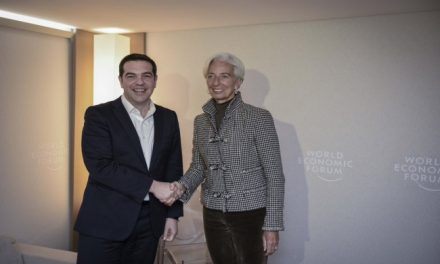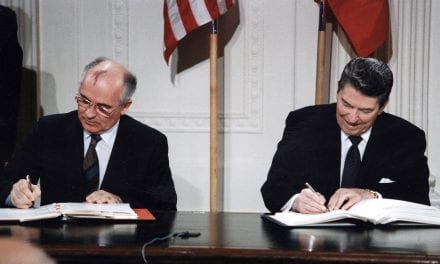Have the Iranians come to the same conclusion as their archenemy Saudi Crown Prince Mohammed Bin Salman? Namely that America doesn’t view the Middle East through the lens of the Israeli-Palestinian conflict anymore, but now prioritizes thwarting Iran’s ambitions as America’s most important national security interest in the region? The three-year experiment that promised moderation of Iranian behavior in exchange for a limited suspension of some of its nuclear activity, retreating from the previous administration’s vow to stop Iran’s nuclear arms program forever, is now over.
According to the Washington Free Beacon, the administration’s strategy “deemphasizes US military intervention, instead focusing on a series of moves to embolden an Iranian population that has increasingly grown angry at the ruling regime.”
America is now positioned to make some real progress, if our national security team has a clear vision of where we want to move the region while avoiding the temptation to reach too far, too quickly. The administration knows that the Iranian economy is in trouble, and that Iranians are not happy with their economic situation. Iran also knows that the perceived lifeline of continued trade with China, Russia and the EU cannot be sustained if America fully enforces sanctions on third parties.
The US Treasury did not waste time, addressing the long-standing but unchallenged problem of Iran’s central bank’s money laundering in the Gulf States to help finance the blacklisted Islamic Revolutionary Guards’ overseas Quds Force.
How Iran responds to the new economic levers the Trump administration can use will depend on how Iran thinks it can exploit the political division in America between supporters and detractors of the Iran agreement, and how much economic pain ordinary Iranians will withstand before taking to the streets again, potentially threatening the stability of the regime.
Iran knows that the Middle East has always been an area America has misunderstood.
They know Congress and Americans think in days and months, impatient for solutions when there are none, while Iran thinks in decades and centuries, willing to wait out American impatience.
Iran is a rational state actor whose primary goal is self-preservation. It may have learned that it underestimated its citizens’ disappointment when the $150 billion in sanctions relief was used for Iranian expansionism in Syria and Yemin, not for their benefit. Has it reassessed the potential pain of new sanctions, especially if the EU decreases trade because it, too, will feel the pain from doing business with Iran?
Could it force Iran to change course and even consider renegotiating the JCPOA? Will the supreme leader and the Revolutionary Guard respond with pragmatism to the new sanctions, or will they choose to escalate the situation as their best option, directly confronting Israel and pursuing Iran’s long-stated policy of erasing the Zionist entity from the earth?
Or do they now believe Israel’s stated intent not to allow an Iranian presence in Syria, and that any attack by one of its proxies will be considered an Iranian-orchestrated attack, making Iran itself vulnerable to retaliation.
Israel doesn’t have to touch a single Iranian nuclear facility to decimate Iran economically. According to Prof.
Hillel Frisch writing in The Jerusalem Post, Israel could just threaten to attack Iran’s Kharg Island, which handles 90% of Iran’s natural gas and oil.
This is well within Israel’s military capacity now, and with Trump allowing Israel greater latitude in military action, Iran must seriously decide if its expansionism is worth the risk.
David Goldman writing in The Asia Times said, “Two dozen Israeli missiles or bomber sorties could wipe out Iran’s economy in a matter of hours… fewer than a dozen power plants generate 60% of Iran’s electricity, and eight refineries produce 80% of its distillates.”
A more likely, lower risk scenario with some plausible deniability would be returning to terrorism outside the Middle East, targeting Israelis and Jews, as Iran did in Argentina and Bulgaria in the past. How would Israel respond? Most likely in a more restrained way, without targeting Iran directly. As of now, only restarting of their nuclear weapons program or an overwhelming Hezbollah war endangering major Israeli cities would elicit an Israeli attack on Iran proper.
Other options Iran could choose are to move closer to the Syrian-Jordanian border trying to destabilize Jordan, indirectly threatening Israel, or increasing Iran’s already significant presence in South America, part of its longterm strategy to undermine America and project Shi’ite hegemony into the Western hemisphere.
If this administration has a plan and plays it right, Iran’s choices will be more limited and its regime could even be endangered, something not possible the day before president Trump withdrew from the JCPOA. As Dan Henninger of The Wall Street Journal wrote, “a year from now, the world may be safer without (the Iran agreement).’ The writer is director of MEPIN™, the Middle East Political and Information Network™. He regularly briefs members of Congress on the Middle East. He is a contributor to The Jerusalem Post, The Hill, and The Forward.


















